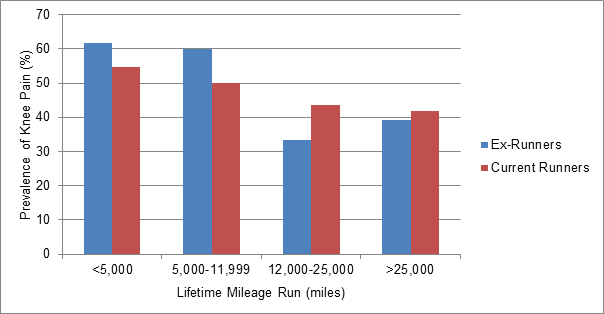Session Information
Session Type: Abstract Submissions (ACR)
Prevalence of Knee Pain in Ultramarathon Runners
Background/Purpose: Approximately one in four Americans suffer from frequent knee pain. While some studies have linked long-distance running with the risk for knee pain, others have not observed such associations. Since the proposed mechanism of such a link involves mechanical stress to the joints, greater lifetime running miles should be associated with a greater risk for knee pain and an earlier age of onset. We tested these expectations by cross sectional analysis of data from the baseline questionnaire of a new cohort of ultramarathon runners.
Methods: The ULTRA study is a cohort of runners who have participated in at least one ultramarathon race (≥50 kilometers) in their lifetime. This study has been enrolling participants since November 2011. For the purposes of this analysis, “knee pain” was defined as “any knee pain in the past 6 months”, as there were almost no individuals with chronic-frequent knee pain in this cohort of high functioning individuals. To assess the impact of mileage on knee pain, we performed a logistic regression model, where the dependent variable was knee pain and independent variables were quartiles of lifetime running distance, age, body mass index (BMI) and current running status. Ex-runners were defined as those who have not run regularly in the preceding 12 months.
Results: Of the 1,083 runners included in the present analysis, 68% were men and 6% were classified as ex-runners. The mean age, and BMI were 44 years and 27 kg/square meters respectively. After adjusting for age, gender and BMI, the prevalence of knee pain was higher in those with lower lifetime mileage, both in runners and ex-runners. Overall rates of knee pain did not differ between runners and ex-runners (47% vs. 48%), and confidence intervals overlapped significantly for knee pain within each mileage group (see Figure). In the logistic regression model, runners in the highest distance quartile (>25,000 miles) were the least likely to report knee pain, OR 0.5 (CI 0.4-0.8), suggesting that lifetime running distance is inversely correlated with knee pain.
Conclusion: Knee pain was more common among low mileage runners; the causal direction of this association can be ascertained in prospective studies. There was no difference in overall knee pain between current and ex-runners.
Disclosure:
V. M. Kelly,
None;
M. Hoffman,
None;
B. Lingala,
None;
M. Bennett,
None;
E. Krishnan,
None.
« Back to 2012 ACR/ARHP Annual Meeting
ACR Meeting Abstracts - https://acrabstracts.org/abstract/prevalence-of-knee-pain-in-ultramarathon-runners/

